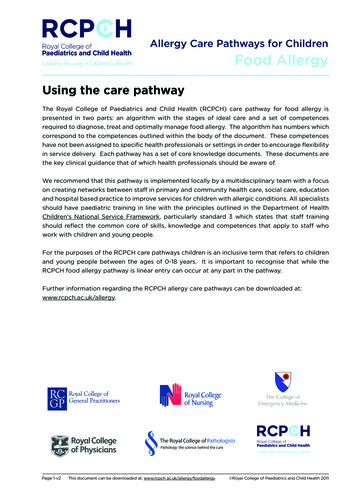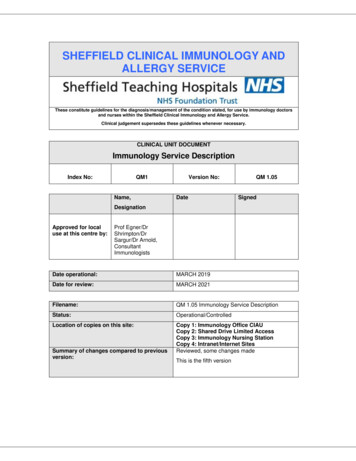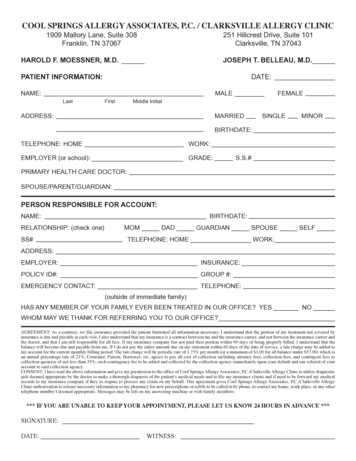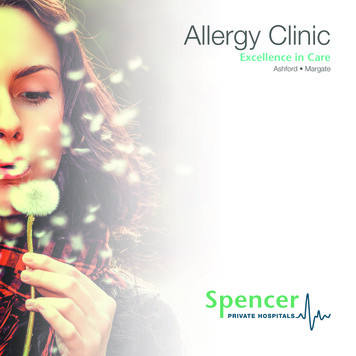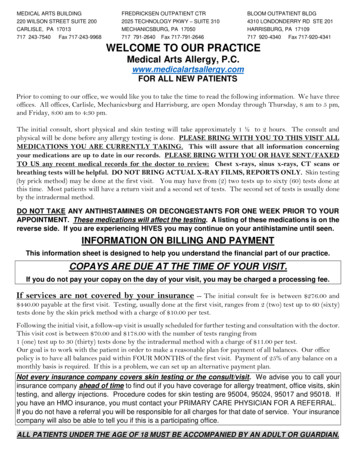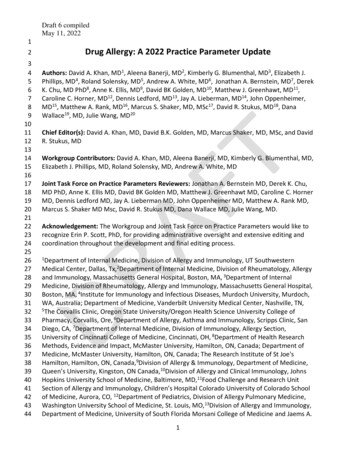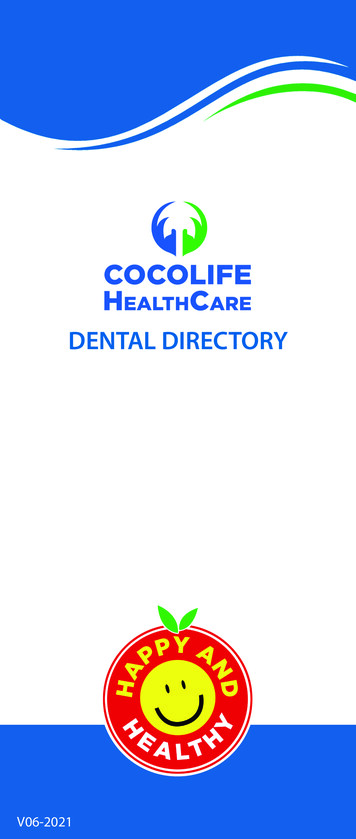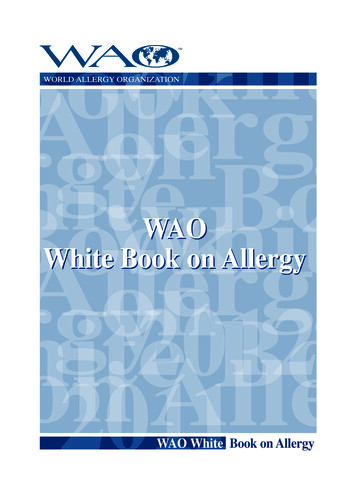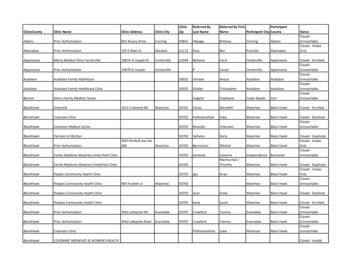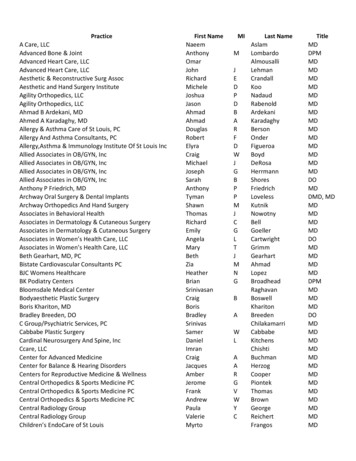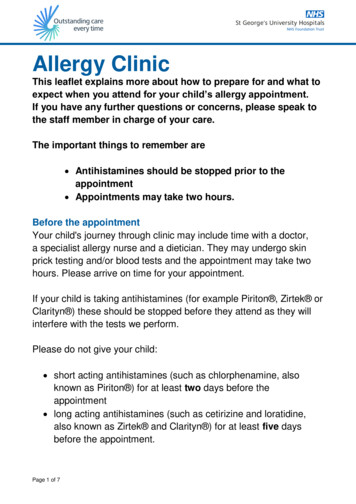
Transcription
Allergy ClinicThis leaflet explains more about how to prepare for and what toexpect when you attend for your child’s allergy appointment.If you have any further questions or concerns, please speak tothe staff member in charge of your care.The important things to remember are Antihistamines should be stopped prior to theappointment Appointments may take two hours.Before the appointmentYour child's journey through clinic may include time with a doctor,a specialist allergy nurse and a dietician. They may undergo skinprick testing and/or blood tests and the appointment may take twohours. Please arrive on time for your appointment.If your child is taking antihistamines (for example Piriton , Zirtek orClarityn ) these should be stopped before they attend as they willinterfere with the tests we perform.Please do not give your child: short acting antihistamines (such as chlorphenamine, alsoknown as Piriton ) for at least two days before theappointment long acting antihistamines (such as cetirizine and loratidine,also known as Zirtek and Clarityn ) for at least five daysbefore the appointment.Page 1 of 7
Please be aware that some cough and cold remedies (such asBenylin ) contain antihistamines. If you are unsure whether yourchild’s medicine contains antihistamines, then please check withyour doctor, nurse or pharmacist. Your child does not need to stopany other medication (such as asthma inhalers, nasal sprays).Please bring to your appointment: photos of the allergic reactions that they have experienced(if available) all of the medicines that your child currently takes, includingany inhalers. If your child uses a spacer device, please alsobring this with you to the appointment previous clinical letters and information from other hospitals snacks and activities to keep your child happy and to distractthem during skin tests if necessary.If your child has been referred for investigation of a suspectedallergic reaction to a drug, it would be helpful if you could bring alongany information from other healthcare professionals that you mayhave, such as a clinic letter or notes, which describe the reaction.Before your appointment, please think about any issues that youwould like to discuss and make a list of questions you may have.Arriving at the appointmentThe allergy clinic is based in the Dragon Centre in the LanesboroughWing at St George's Hospital. Our receptionist will greet you onarrival.Your child will have their height and weight measured by a memberof our nursing team.Page 2 of 7
If your child is under one year old, they shall be weighed with clothesand nappy removed. If they are older than a year they need onlyremove their shoes and coat. Please bring your child’s red book(personal child health record) with you; the weight and height can berecorded in this.Please arrive 5-10 minutes before your appointment to allow yourchild to be measured.Food and DrinkMost of our patients have food allergies. Please make sure no foodis dropped or left unattended within the clinic to ensure everyone’ssafety. Please do not bring hot drinks.What to expect at your appointmentYour child may see a variety of specialists including doctors, nursesand dieticians. He/she may also undergo allergy testing. There ismore information about the different allergy tests below. We mayprovide advice on: managing allergic diseases, such as showing you how to useinhalers and nasal sprays correctly managing your child’s eczema what to do if your child has an allergic reaction, including thecorrect use of antihistamines and adrenaline auto injectors.The dietician may be asked to see you to provide advice on foodallergen avoidance and suitable food alternatives, ensuring yourchild meets all the necessary nutritional requirements for a healthy,balanced diet.Page 3 of 7
St George's is a teaching hospital and therefore there are medical,nursing and other healthcare students observing clinics. If you wouldprefer a student not to be present in the consultation then please letthe receptionist know when you arrive.Allergy testsThere are two different allergy tests which may be performed at yourchild’s appointment: skin prick tests (SPT) and specific IgE bloodtests. The team will discuss with you which tests are mostappropriate for your child.Skin Prick TestsSPTs are performed by our nurse specialists or doctors and requireexpert interpretation to be useful. The diagnosis of an allergyrequires careful consideration of both the patient’s symptoms andthe test results.We have SPT extracts for many allergens such as nuts, egg, milk,fish, pollens and animals. Some food allergens are unstable insolution. If you suspect your child may be allergic to fruit,vegetables, coconut or legumes (lentil/chickpea/peas/beans) andwish your child to be tested for these, please bring a small quantityof the particular food with you to the clinic.The SPTs are labelled by writing in pen beside the drop of skin testsolution. A superficial skin prick with a small metal lancet thenintroduces the SPT solution into the skin surface. It can feel sharpbut doesn’t “hurt”.After 15-20 minutes a small, itchy bump (wheal) may appear wherethe SPT was performed and this is measured. The skin can becomered and itchy where the SPT was performed. We will ask your childnot to scratch this as this can make it difficult to measure the wheal.Page 4 of 7
Sometimes distracting younger children during the test helps whenthey are reluctant to proceed. Therefore, you may like to bring afavourite toy or hand held game with you to the appointment todistract your child while they are having SPTs performed.Specific IgE blood testsSometimes it is not possible to perform SPTs on a child andsometimes a blood test is a more appropriate test. The results ofspecific IgE blood tests can take up to two weeks to becomeavailable and require expert interpretation.The children’s blood test department is also situated in the DragonCentre and blood tests can be performed on the same day as yourappointment on all days apart from Fridays.After the appointmentAt the end of the consultation a plan for your child’s continuing carewill be discussed. The plan may include new medications. If yourchild has a food allergy, a written management plan will be providedand food challenges will be discussed where appropriate.A letter will be sent to you, your child’s GP and any other healthcareprofessionals involved in your child’s care, recording thisinformation.If your child has had a blood test, we will include the results of this inthe clinic letter. If necessary, you may also be contacted by phone todiscuss the results.Useful sources of informationFurther information about allergies and allergy testing can be foundat:Allergy UK www.allergyuk.orgPage 5 of 7
NHS website https://www.nhs.uk/conditions/allergies/The anaphylaxis campaign www.anaphylaxis.org.ukContact usIf you have any questions or concerns about your child’s allergy clinicappointment, please contact the children’s secretaries via e-mail atchildrens.secretariesC@stgeorges.nhs.ukFor more information leaflets on conditions, procedures,treatments and services offered at our hospitals, please visitwww.stgeorges.nhs.ukAdditional servicesPatient Advice and Liaison Service (PALS)PALS can offer you on-the-spot advice and information when youhave comments or concerns about our services or the care you havereceived. You can visit the PALS office between 9.30am and4.30pm, Monday to Friday in the main corridor between Grosvenorand Lanesborough wings (near the lift foyer).Tel: 020 8725 2453 Email: pals@stgeorges.nhs.ukNHS ChoicesNHS Choices provides online information and guidance on allaspects of health and healthcare, to help you make decisions aboutyour health. Web: www.nhs.ukNHS 111You can call 111 when you need medical help fast but it’s not a 999emergency. NHS 111 is available 24 hours a day, 365 days a year.Calls are free from landlines and mobile phones. Tel: 111AccessAbleYou can download accessibility guides for all of our services bysearching ‘St George’s Hospital’ on the AccessAble website(www.accessable.co.uk). The guides are designed to ensurePage 6 of 7
everyone – including those with accessibility needs – can access ourhospital and community sites with confidence.Reference: PAM AC 02 LPPage 7 of 7Published: November 2020Review date: November 2022
Allergy Clinic This leaflet explains more about how to prepare for and what to expect when you attend for your child's allergy appointment. If you have any further questions or concerns, please speak to the staff member in charge of your care. The important things to remember are Antihistamines should be stopped prior to the appointment
